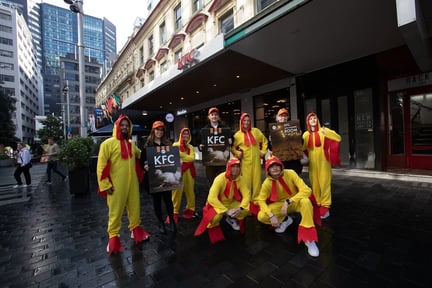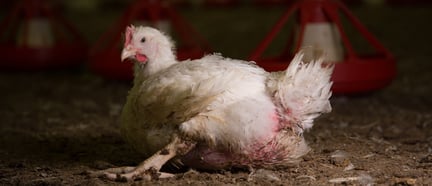
What is octopus farming? 5 reasons we need an octopus farming ban
News
Octopus farming is a form of factory farming that involves confining octopuses to barren tanks and freezing them alive for food. Here are five reasons why the Government must enact a pre-emptive ban on this cruel practice.
As the global demand for seafood grows, a new and deeply troubling octopus farming industry is emerging. Despite growing ethical concerns, the government of Aotearoa New Zealand has already granted NZ$1 million of taxpayer money to fund research into this industry and is considering further investment.
What is octopus farming and why should it be banned?
Octopus farming is a form of factory farming. It involves breeding and raising octopuses in captivity for food. These solitary animals are confined to barren tanks and subjected to crowded, unnatural conditions where stress, cannibalism, and suffering are inevitable. There are currently no approved humane slaughter methods for octopuses. Here are five reasons we need a pre-emptive ban on octopus farming:
1) Octopuses are highly intelligent beings
Octopuses are solitary and intelligent who thrive in the wild. Scientists have long recognised these animals as among the most intelligent invertebrates on Earth. They can solve puzzles, open jars, navigate mazes, mimic other species, and even use tools - behaviours we usually associate with mammals like primates or dolphins. But in factory farming conditions, they receive little stimulation and are stripped of the very behaviors that define who they are.
2) Captivity causes suffering and stress
Octopuses are soft-bodied and do not tolerate social interaction. When forced into tight quarters, they may lash out, injure each other, or resort to cannibalism out of stress. Some have been observed chewing off their own arms in captivity. No matter how “high-tech” a facility claims to be, it cannot replicate the natural marine environment. Octopus farming in Aotearoa would mean suffering from birth to death for thousands or possibly millions of animals.
3) Octopus farming is not sustainable
Despite claims that it could reduce pressure on wild populations, octopus farming would actually increase demand for wild-caught fish. These animals are carnivorous and require a high-protein diet. It can take up to three kilograms of fish to produce just one kilogram of octopus meat. This would place even greater strain on already overfished marine ecosystems. You cannot fix an unsustainable system by creating another one on top of it.
4) Slaughter methods are terrifying and painful
There is no humane method for slaughtering octopuses. In captivity, they are typically killed by being clubbed, suffocated, or frozen alive in ice slurry. Freezing might sound gentle, but studies show that octopuses can remain conscious and in pain long after being submerged. Their complex nervous systems do not shut down quickly, meaning they may suffer a slow, terrifying death.
5) The world is already saying no
International scientists and ethicists are urging governments to halt the development of commercial octopus farms. In 2024, Washington became the first US state to ban octopus farming, calling it inhumane and environmentally harmful. California followed soon after, further solidifying the growing opposition to this cruel industry.
In the UK, octopuses are legally recognised as sentient beings. It’s clear that the suffering caused by this industry far outweighs any perceived economic or culinary benefit.
How can you help stop octopus farming?
Together with more than 160 organisations, we recently signed an open letter urging the Government to ban octopus farming. We applaud our allies at Animals Aotearoa and the Aquatic Animal Alliance who are leading on this powerful call.
We have a chance to stop this before it begins. The government must act now to ensure this cruel and unsustainable practice never takes hold here. Keep an eye out for actions you can take to support this call.
Together, we can stop octopus farming and protect these intelligent animals from a lifetime of suffering.
About us
At World Animal Protection we move the world to protect animals because we know that the life of every animal counts.
Factory farming
We work tirelessly to ensure farmed animals live good lives by transforming the global food system and attitudes towards farm animal welfare.

